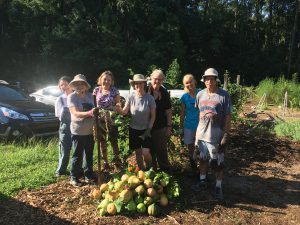During my three years working for the Extension Office, I have found that Extension work leaves you extended in many different directions. There are expectations to perform at many different levels and to serve many different constituent groups. From interactions with professional organizations, to assisting with community-wide events, to getting the word out to folks unfamiliar with Extension, it adds up to a lot of potential work out there.
Helping homeowners and/or industry with their specific issues is definitely where the rubber meets the road. Fortunately, in 1973, an extension agent in Washington State came up with a great plan – train interested volunteers in how to properly handle specific requests so they can help get all of this work done. And so was born the Master Gardener Volunteer (MGV) program. In Florida, we are entering the 40th year of the MGV program! Since National Volunteer Week is this week (April 7-13), I thought I would take the opportunity to celebrate the work of MGVs in our area.
In Leon County, one MGV, Janis, has been coordinating the vegetable gardening group, locally known as the VegHeadz, for 8 years. More than once, I’ve heard praises of Janis for her ability to get folks excited about “enter vegetable here”, maybe a Chayote squash, Malabar spinach, food forests, cover crops, soil organic matter, and the list goes on. What makes Janis such a great MGV is her ability to share gardening information, which comes from her pure passion for the topic and her desire to keep learning and experimenting. In addition to sharing information, the VegHeadz also donate much of the produce harvested from our office, approximately 300 pounds a year, to the Second Harvest Food Bank.

Our happy VegHeadz Group after a day of work in the garden. Led by the incredible Janis Piotrowski (center, black shirt). Credit: Mark Tancig
In counties throughout the panhandle, there are other MGVs providing research-based horticulture information to school groups and civic organizations. Many of them spend time helping to teach Floridians of the importance of protecting Florida’s natural resources while creating a beautiful landscape through the use of Florida-Friendly Landscaping principles.
Clearly, volunteers are great because they help UF/IFAS, and other organizations, get more work done without any monetary input. However, many studies have found that it’s not just the organization who benefits. Based on a review of research published by the Corporation for National and Community Service, volunteers not only give, but also receive the following benefits:
- Lower mortality rates, greater functional ability, and lower rates of depression than those who do not volunteer
- Physical and social activity and a sense of purpose at a time when their social roles are changing
- Higher levels of happiness, life-satisfaction, and self-esteem
The same research review found that volunteers have a greater level of trust in their community, greater level of trust in their local government, and are twice as likely to donate to charitable causes. So not only do the organizations and the individuals benefit, but the whole community shares in these volunteers’ selfless donation of expertise and time.
Now, during National Volunteer Week, be sure to thank a volunteer for their work. If you see MGVs at community events, please say thank you for their role in spreading research-based, environmentally-sound horticulture knowledge to the community.
- When to Worry About Your Citrus During Cold Weather - December 18, 2025
- A Tale of Two Hoses - November 13, 2025
- Anthracnose and Aster Yellowing Diseases Recently Diagnosed - August 28, 2025

